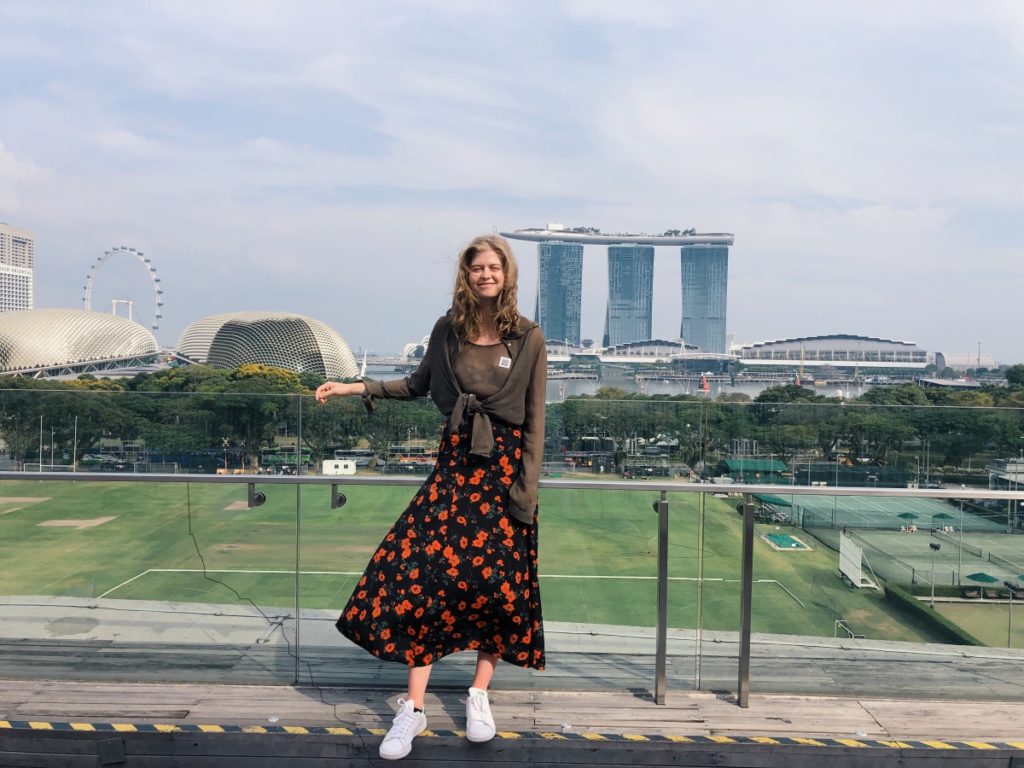What's New
29 August, 2019
Interview: Young filmmaker Harriett Maire

Takapuna’s Harriett Maire, who has already tasted awards success for her short films, tells Emelia Lake about the challenge of being a female director and her desire to create multi-dimensional roles for women.
Accomplished young film director Harriett Maire uses first-hand experiences and in-depth research to portray authentic female characters in her work.
Takapuna resident Maire, 24, has won several awards for her short films including a 2016 Jury Choice Award at the Diversity in Cannes showcase for Anna, which revolved around a young girl with autism.
Anna was created as her graduating project in her communications degree at AUT University, and caught the eye of production company Film Construction, which now has her on its roster of directors.
“I spent a lot of time researching at the Autism Foundation, because I have never personally experienced what it’s like to have autism, and so it was super-important to me not to misrepresent,” Maire says.
Maire also picked up a special category award at NASA’s Cinespace for another short film, Lani’s Space, which she co-directed with fellow young filmmaker Ferris Bradley.
Lani’s Space follows Manu, a solo father, and his daughter’s fixation with outer space.
Maire describes her own childhood as filled with all sorts of different health issues, after she was diagnosed as a diabetic at age seven.
“I remember not seeing any people like me in movies and now I think back to how much that would have helped me normalise what I was going through when I was younger.”
She is passionate about creating films that fill in such gaps, especially when it comes to female characters.
“I want to make films that don’t focus on women’s looks at all,” she says.
“Can women stop being so sexualised, please? I’m not saying a woman can’t own her sexuality, but it depends who is making it for who.”
“There are too many female characters created by men that are put there to be sexually appealing. I think if you’re trying to create any piece of art that involves anything that you haven’t personally experienced you need to do a hell of a lot of research.”
“I want to make films with female characters that are multi-dimensional.”
Maire, who grew up in Bayswater, lives in Takapuna with her partner.
She attended Takapuna Grammar school, where she acted in several plays.
In her final year of high school, she won a Sheilah Winn Shakespeare competition and was flown to the UK to perform in the Globe Theatre.
Her flirtation with Shakespearian acting continued when she starred in a 2014 webseries entitled Nothing Much To Do.
The series was a modern-day adaptation of Much Ado About Nothing, with Maire starring as Beatrice.
“The more time I spend in the industry, however, the more I realise I am not an actress,” she says.
Maire majored at AUT in television and screen production.
She caught the film bug early: “I do truly believe that it is in my blood.”
Her father, Renaud Maire, is a cinematographer known for his work on TV dramas, feature films and documentaries.
“You use every card you can when you have to. When people find out who my dad is they say, ‘Oh that’s why you’re here’,” she says.
“I’m not a camera person like Dad, so it’s challenging having to prove myself but also pave my own way,” she says.
“If you’re not good then people will stop opening doors for you, simple as that. They’re not going to go, ‘Oh but she’s such and such’s daughter’. I want to use that to both check my privilege and acknowledge it.”
Trying to make it as a woman in a male-dominated industry has had its trying moments, she says.
“It’s hard being a female director. There aren’t a lot of them. Roles with more power seem to be more male-dominated. You get sexism wherever you are as a woman.”
“I remember going to a talk by a really great cinematographer and I went up at the end to thank him for some of his work that had really inspired me, and he asked if I was with the catering company.”
Maire supports herself through her freelance film work, which has included commercials and work with Vice New Zealand.
“I haven’t written a CV since back when I worked in hospitality. It’s all word of mouth,” she says.
“Working in film feels like being part of a family. You’re all there to pitch in and create a story.”
Maire says that performance directing is her main love, and she continues to take on personal projects.
She defines performance directing as having ample opportunity to focus on the actor and their work within a piece.
“I pride myself on character-driven stories that centre around human connection. All of that comes from the actor’s performance,” she says.
Single/single is one of Maire’s ongoing projects, a collection of one-take monologues performed by different actors.
Each actor recites pieces of theatre script, poetry or an excerpt from a book or film whilst looking down the barrel of the camera lens.
This is something that is not supposed to feel confronting, but rather to feel as though the actor is sharing something personal with you, says Maire.
“It’s the most delicious combination of film and theatre,” she says.
“Working in film feels like being part of a family. You’re all there to pitch in and create a story.”
Maire is also currently co-directing a theatre piece, Animal, in conjunction with Stray Theatre.
It is an adaptation of George Orwell’s Animal Farm, set in the 21st century and focusing on the consequences of colonialism in New Zealand.
“Hopefully it sparks some discussion that is relevant to things that are happening now.”
Maire is enjoying crafting one of the main characters in the play, Kitty.
“She is supposed to be cat-like, but I don’t want her to be anything like Catwoman, who is slinky and overly sexualised.
“To me cats aren’t sexy at all. I’m not sure how that came about.”
“Further to that, I find it upsetting to watch a woman be distressed by men in films, and I don’t think the depiction of rape does anything for the viewer except become gratuitous.”
Maire would like to see other natural feminine occurrences, such as menstruation, become normalised in film.
“There’s a huge amount of blood in war and death that has become accepted as normal in film, but somehow the blood of life is not okay. Periods are something that I would like to explore in a very matter-of-fact way.”
Anxiety is another subject matter she looks forward to exploring in her films.
“I’m a really anxious person. I think our whole generation is,” she says.
“I think it’s a really important thing, to be a part of a movement that’s like, ‘Yeah we’re going to touch on this.’”
This article originally appeared in the August 30 edition of the Rangitoto Observer. Download PDF.

